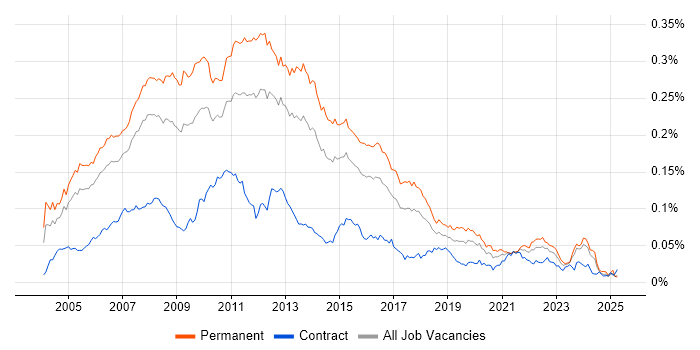.NET Application Developer
UK
The median .NET Application Developer salary in the UK is £52,500 per year, according to job vacancies posted during the 6 months leading to 12 July 2025.
The table below provides salary benchmarking and summary statistics, comparing them to the same period in the previous two years.
| 6 months to 12 Jul 2025 |
Same period 2024 | Same period 2023 | |
|---|---|---|---|
| Rank | 730 | 816 | 871 |
| Rank change year-on-year | +86 | +55 | +325 |
| Permanent jobs requiring a .NET Applications Developer | 5 | 83 | 26 |
| As % of all permanent jobs advertised in the UK | 0.008% | 0.080% | 0.030% |
| As % of the Job Titles category | 0.009% | 0.085% | 0.033% |
| Number of salaries quoted | 5 | 74 | 19 |
| 10th Percentile | - | £46,875 | £42,500 |
| 25th Percentile | £48,750 | £58,250 | £44,500 |
| Median annual salary (50th Percentile) | £52,500 | £61,500 | £57,500 |
| Median % change year-on-year | -14.63% | +6.96% | +35.29% |
| 75th Percentile | £62,500 | £64,750 | £75,000 |
| 90th Percentile | - | £65,000 | £84,000 |
| UK excluding London median annual salary | £60,000 | £61,500 | £47,500 |
| % change year-on-year | -2.44% | +29.47% | +7.95% |
All Permanent IT Job Vacancies
UK
For comparison with the information above, the following table provides summary statistics for all permanent IT job vacancies. Most job vacancies include a discernible job title that can be normalized. As such, the figures in the second row provide an indication of the number of permanent jobs in our overall sample.
| Permanent vacancies in the UK with a recognized job title | 53,806 | 98,156 | 78,673 |
| % of permanent jobs with a recognized job title | 89.55% | 94.80% | 91.62% |
| Number of salaries quoted | 29,744 | 68,646 | 53,875 |
| 10th Percentile | £27,500 | £29,000 | £32,500 |
| 25th Percentile | £37,574 | £38,750 | £44,109 |
| Median annual salary (50th Percentile) | £55,000 | £52,500 | £60,000 |
| Median % change year-on-year | +4.76% | -12.50% | - |
| 75th Percentile | £73,708 | £70,000 | £80,000 |
| 90th Percentile | £95,000 | £90,000 | £100,000 |
| UK excluding London median annual salary | £50,000 | £50,000 | £53,000 |
| % change year-on-year | - | -5.66% | +4.00% |
.NET Applications Developer
Job Vacancy Trend
Job postings that featured .NET Applications Developer in the job title as a proportion of all IT jobs advertised.

.NET Applications Developer
Salary Trend
3-month moving average salary quoted in jobs citing .NET Applications Developer.
.NET Applications Developer
Top 6 Job Locations
The table below looks at the demand and provides a guide to the median salaries quoted in IT jobs citing .NET Applications Developer within the UK over the 6 months to 12 July 2025. The 'Rank Change' column provides an indication of the change in demand within each location based on the same 6 month period last year.
| Location | Rank Change on Same Period Last Year |
Matching Permanent IT Job Ads |
Median Salary Past 6 Months |
Median Salary % Change on Same Period Last Year |
Live Jobs |
|---|---|---|---|---|---|
| England | +80 | 5 | £52,500 | -14.63% | |
| Work from Home | +42 | 5 | £52,500 | -14.63% | |
| London | +85 | 4 | £52,500 | -4.55% | |
| UK excluding London | +88 | 1 | £60,000 | -2.44% | |
| Midlands | +77 | 1 | £60,000 | +33.33% | |
| West Midlands | - | 1 | £60,000 | - |
.NET Applications Developer Skill Set
Top 30 Co-occurring Skills and Capabilities
For the 6 months to 12 July 2025, .NET Applications Developer job roles required the following skills and capabilities in order of popularity. The figures indicate the absolute number co-occurrences and as a proportion of all permanent job ads featuring .NET Applications Developer in the job title.
|
|
.NET Applications Developer Skill Set
Co-occurring Skills and Capabilities by Category
The follow tables expand on the table above by listing co-occurrences grouped by category. The same employment type, locality and period is covered with up to 20 co-occurrences shown in each of the following categories:
|
|
|||||||||||||||||||||||||||||||||||||||||||||||||||||||||||||||||||||
|
|
|||||||||||||||||||||||||||||||||||||||||||||||||||||||||||||||||||||
|
|
|||||||||||||||||||||||||||||||||||||||||||||||||||||||||||||||||||||
|
|
|||||||||||||||||||||||||||||||||||||||||||||||||||||||||||||||||||||
|
|
|||||||||||||||||||||||||||||||||||||||||||||||||||||||||||||||||||||
|
||||||||||||||||||||||||||||||||||||||||||||||||||||||||||||||||||||||
